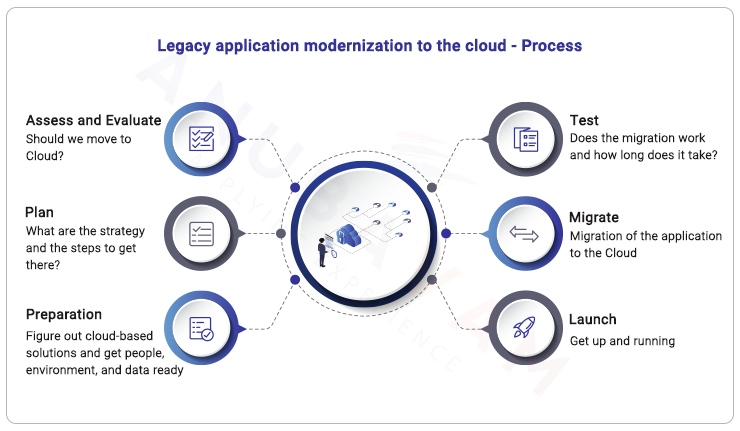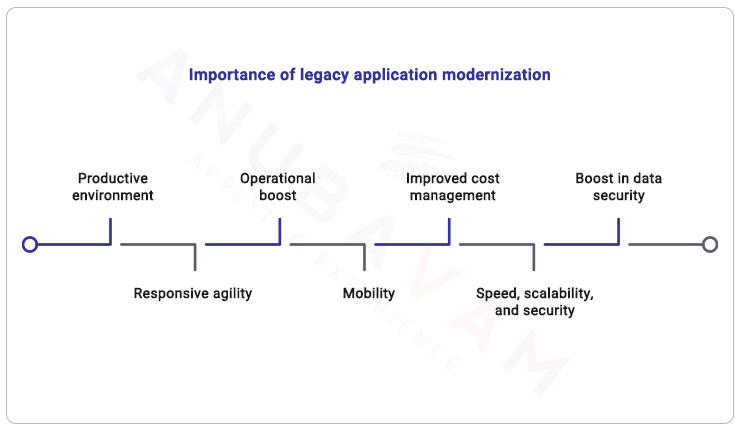Legacy application migration is the process of moving, updating, and maintaining programs that are no longer in use. Businesses need to update any old programs they use to stay on top of the market and keep up with how quickly technology is changing. Modernity has many benefits, but it also has some problems. Let's discuss this in more detail.
What is "legacy migration to the cloud"?
The process of migrating legacy applications, data, and other components from an environment that is hosted on-premises to an environment that is hosted in the cloud is referred to as "legacy migration to the cloud."
This process may comprise a number of steps, such as evaluating the current environment, developing a cloud-based architecture, moving data and applications, and testing the new environment. Among the other possible steps in this process are these: The migration of legacy systems to the cloud should ultimately have the purpose of capitalizing on the scalability, cost reductions, and other advantages offered by cloud computing.
What is legacy application modernization to the cloud - saas?

Legacy application modernization to the cloud is the process of moving an existing application from its current platform to a cloud-based Software as a Service (SaaS) platform. This process involves a number of steps, such as evaluating the existing application, finding possible cloud-based solutions, and moving the application to the cloud.
The first step is to look at the application that is already there. To do this, you need to know how the application is put together, what its data and code are, and what it depends on. This evaluation will help figure out where improvements could be made and if there are any risks that could come with the move.
The next step is to look for cloud-based solutions that might work. This means looking into and comparing different cloud-based SaaS solutions to find the one that fits the application's needs best. This means thinking about things like features, cost, scalability, and security.
After finding a cloud-based solution, the application must be moved to the cloud. This means moving the application's data and code to the cloud and setting up the application to work with the cloud-based platform. Depending on how complicated the app is, this process may need some custom coding.
Lastly, once the app is running on the cloud-based platform, it needs to be tested and kept an eye on to make sure it is working as planned. This includes testing how the app works, how fast it runs, and how safe it is.
Why legacy application migration to the cloud is important?

The migration of legacy systems to the cloud is becoming more popular as more and more businesses look for ways to save money, grow, and change with cloud computing. Legacy systems are notorious for having high maintenance costs and being difficult to modernize, which makes them an ideal candidate for migration to the cloud.
Migration to the cloud can also help firms decrease their expenditures on information technology, increase their agility, and improve their security posture. Also, organizations can gain a competitive edge by moving their operations to the cloud. This lets them use the latest technological advances, like artificial intelligence and machine learning, to their advantage.
Business considerations - migrating a legacy application to the cloud
- Moving to the cloud can minimize the cost of hardware, software, and IT personnel, allowing firms to reallocate their resources to other areas.
- Scalability: Cloud computing enables businesses to swiftly and easily scale up or down based on their needs.
- Modernized Legacy Applications that are extremely scalable, allowing for various deployment platforms and automation, increase productivity and creativity.
- Because they are regularly checked and updated, cloud-based applications are more secure than traditional on-premise applications.
- Increased client satisfaction as a result of upgraded apps meeting contemporary performance and user experience criteria.
Why should you select Anubavam for your legacy application modernization journey?
Choosing the best cloud migration partner is essential to the success of your company. Join forces with us to streamline your migration procedure. To help you maximize your cloud investment, we can manage your applications seamlessly. Our team is equipped with skilled developers who have experience working with the top cloud computing platforms.
Anubavam provides a variety of cloud app development services tailored to each client's specific needs. We support you throughout the migration lifecycle as a reputable provider of legacy application migration services, starting with an as-is system/server analysis and continuing through the movement of apps, data, and services. It has a range of effective and ongoing maintenance services. Contact our team for more information.
Related Articles
A Guide to Modernizing Legacy applications with Low-Code and No-Code Platforms
Modernizing Legacy applications continue to be a barrier in the way of the digital transformation of many organizations. Without clarity or a hurried discovery phase, most of the l…
Read More →Subscribe to the Creatrix Blog
Fresh insights on higher education, straight to your inbox.
We respect your privacy.
Want to contribute?
We welcome thought leaders to share ideas and write for our blog.
Become a Guest Author →
